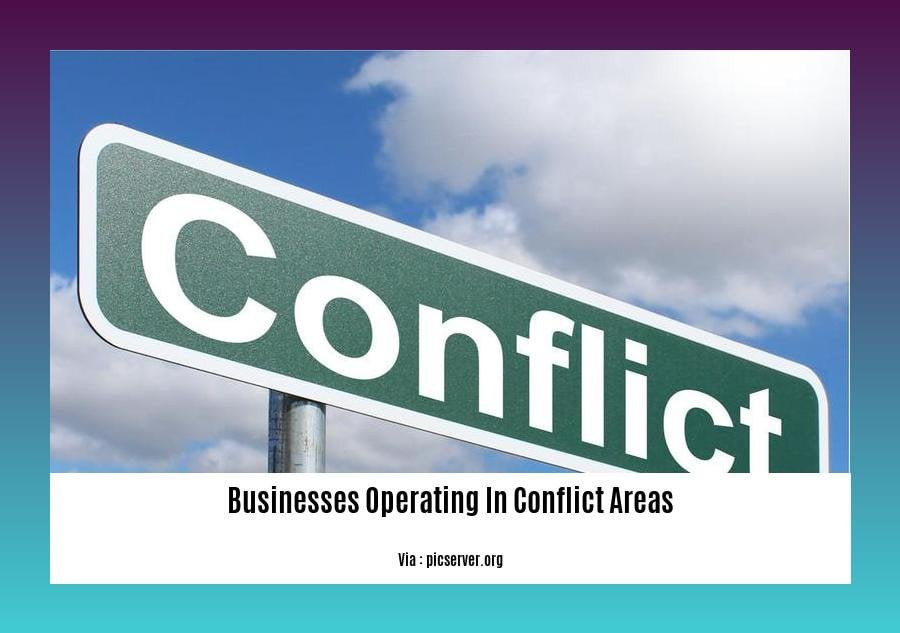Delve into the intricacies of operating within conflict zones with “[Navigating Conflict Zones: Challenges and Strategies for Businesses Operating in Conflict Areas].” This article explores the unique challenges businesses face when navigating high-risk environments, highlighting the importance of enhanced human rights due diligence and effective mitigation strategies.
Key Takeaways:

- Business operations in conflict zones can inadvertently fuel conflict and human rights abuses.
- Conflict and human rights violations have a cyclical relationship.
- Businesses in these regions must assess and minimize their impact on local conflicts.
- Existing due diligence processes should be modified to address conflict-specific risks.
- The UN Working Group advocates for enhanced human rights due diligence in high-risk contexts.
Businesses Operating in Conflict Areas: A Guide to Responsible Operations
The presence of businesses operating in conflict areas carries significant risks and challenges. Conflicts exacerbate corruption, instability, and human rights violations, creating a complex landscape for business operations. This guide aims to equip businesses with strategies to navigate these challenges:
Understanding the Impact on Conflict Dynamics
Businesses operating in conflict areas must assess their impact on existing conflict dynamics. Failure to do so can lead to unintended consequences, worsening the situation. Therefore, it’s crucial to:
- Identify stakeholders: Engage with local communities, governments, and armed groups to understand their interests and concerns.
- Map potential risks: Anticipate how business activities may affect local conflicts and human rights.
- Conduct due diligence: Thoroughly research the area’s history, political dynamics, and potential risks.
Mitigating Impact and Respecting Human Rights
Businesses operating in conflict areas have a responsibility to mitigate their impact and respect human rights. This includes:
- Adopting conflict-sensitive policies: Establish clear guidelines for operations to avoid exacerbating conflict or violating human rights.
- Implementing grievance mechanisms: Provide accessible channels for affected parties to raise concerns and seek remedies.
- Investing in local communities: Support initiatives that promote peace, stability, and sustainable development.
Adapting Due Diligence for High-Risk Contexts
Existing due diligence measures may not adequately address the unique challenges of businesses operating in conflict areas. Therefore, it’s essential to:
- Enhance risk assessment: Utilize specialized tools and frameworks to identify and analyze conflict-related risks.
- Strengthen stakeholder engagement: Collaborate with local stakeholders to identify potential risks and develop mitigation strategies.
- Monitor and report: Establish mechanisms to track progress and report on the effectiveness of conflict mitigation efforts.
Conclusion
Businesses operating in conflict areas face complex challenges. By understanding the impact on conflict dynamics, mitigating their impact, respecting human rights, and adapting due diligence measures, businesses can navigate these risks and operate responsibly in these sensitive environments.
Understand the corporate complicity in warzones that businesses often partake in, despite potential detrimental impacts on locals. Factors, such as commercial interests in unstable regions, can contribute to the ways in which companies and armed conflicts intersect and impact global stability.
Enhanced Human Rights Due Diligence
When it comes to navigating conflict zones, businesses have a crucial responsibility to uphold human rights. This means going beyond standard due diligence and implementing Enhanced Human Rights Due Diligence (EHRDD).
EHRDD entails adopting heightened measures to identify, prevent, and mitigate any negative impacts on human rights. It involves seeking conflict-sensitive resources, incorporating atrocity prevention tools, developing context-specific grievance mechanisms, and engaging with local communities.
Key Takeaways:
- EHRDD is essential for responsible business operations in conflict-affected areas.
- It protects human rights, reduces risks for businesses, and builds trust with stakeholders.
- Examples of atrocity prevention include early warning systems, staff training, and peacebuilding engagement.
- Companies must report human rights violations to relevant authorities.
Implementing EHRDD:
- Consult conflict-sensitive resources and advisors to gain insights into local dynamics.
- Incorporate atrocity prevention and conflict mitigation tools into operations.
- Establish effective grievance mechanisms that are accessible and responsive to local communities.
- Engage regularly with local communities, groups, and human rights organizations.
- Apply a gender-responsive approach to ensure the protection of women and marginalized groups.
- Participate in truth and reconciliation processes to support post-conflict recovery.
By implementing EHRDD, businesses can operate responsibly in conflict-affected areas, contribute to human rights protection, and build lasting relationships with local stakeholders.
Citation:
- UNDP: Heightened Human Rights Due Diligence for Business in Conflict-Affected Areas
Heightened Human Rights Due Diligence For Business In Conflict-Affected Contexts A Guide
Balancing business operations with human rights obligations is a crucial challenge in conflict zones. Here are some key considerations and practical steps for businesses to follow:
Elements of Heightened Due Diligence
In conflict-affected areas, due diligence goes beyond standard practices. It involves:
- Enhanced monitoring and reporting to track human rights impacts.
- Engaging with local communities, stakeholders, and human rights organizations to understand risks and concerns.
- Implementing conflict-sensitive policies and procedures to minimize harm.
Importance of Conflict-Sensitive Approach
Businesses must adopt a conflict-sensitive approach that considers the potential consequences of their activities on local populations. This means avoiding activities that may fuel conflict or undermine peace efforts.
Meaningful Stakeholder Consultation
Engaging with affected groups is essential. Consult with vulnerable communities, government authorities, armed groups, and civil society organizations to gather diverse perspectives and mitigate potential negative impacts.
Effective Implementation of Due Diligence
Establish and implement robust due diligence measures proportionate to the risks involved. Regularly monitor, evaluate, and improve these practices to ensure their effectiveness.
Key Takeaways:
- Businesses operating in conflict zones have heightened human rights due diligence responsibilities.
- Heightened due diligence involves specific measures to address the increased risks and complexities of these environments.
- A conflict-sensitive approach is crucial to minimize negative impacts on local populations.
- Meaningful stakeholder consultation ensures diverse perspectives are considered.
- Effective implementation and ongoing improvement of due diligence practices are essential.
Relevant URL Source:











